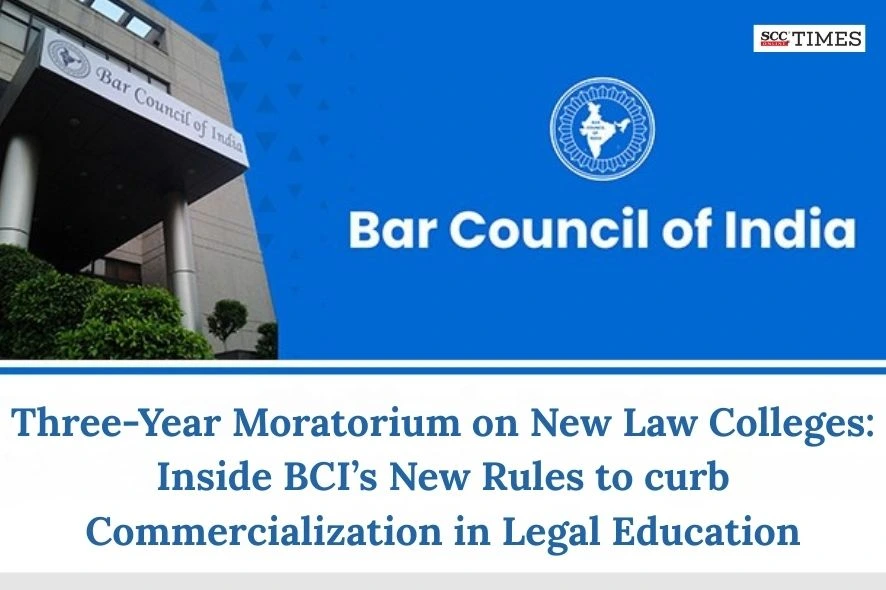On 13-8-2025, the Bar Council of India (‘BCI’) notified the Rules of Legal Education-Moratorium (Three-Year Moratorium) with respect to Centers of Legal Education, 2025, to impose a complete ban on the establishment of new law colleges, Centers of Legal Education (‘CLEs’). These Rules came into force on 20-8-2025 and will be applicable for a continuous period of three years.
Key Points of Rules regarding Legal Education Moratorium (Three-Year Moratorium):
-
BCI has enacted these Rules under the provisions of the Advocates Act, 1961, specifically Sections 7, 7(1)(h), 7(1)(i), 24(1)(c)(iii), and 49(1)(af), (ag), and (d).
-
These Rules clearly defined the scope and definition of Centers of Legal Education. Irrespective of the fact whether the institute is approved by BCI or not, the CLEs will include any:
-
University
-
University department
-
Constituent college
-
Institution
-
Law school
-
Law college offering legal education
-
-
A Moratorium Period means the duration from the effective date of these Rules until applicable, which is three-year.
-
During the Moratorium Period, there is a prohibition levied:
-
No new CLEs can be established or approved during the Moratorium Period.
-
Universities and governments are barred from submitting any fresh proposals.
-
Pending applications by CLEs already in process will be considered under existing law.
-
Existing CLEs cannot start new sections, courses, or batches without explicit BCI approval.
-
Approvals will be granted only in exceptional cases with full compliance to infrastructure, faculty, and academic standards.
-
All approvals are subject to review and audits.
-
-
Rule 6 specifies the reasons behind the imposition of moratorium period:
-
Uncontrolled growth of CLEs without academic justification.
-
Negligence in maintaining standards.
-
Evidence of substandard teaching and unfair practices.
-
Faculty shortages and commercialization of degrees.
-
Violations of Rule 23 of the BCI Legal Education Rules, 2008.
-
-
Under these Rules a dedicated Monitoring and Enforcement Cell to oversee compliance during the Moratorium Period, will be constituted, which will ensurethe following:
-
Maintain a centralized database of all CLEs, their approval status, inspection reports, and compliance records.
-
Receive complaints or reports of violations from students, faculty, or the public.
-
Conduct surprise inspections and initiate inquiries where necessary.
-
-
Rule 7 mandates a three-stage approval process for establishing a new CLE in the given manner:
-
A No Objection Certificate (NOC) must be obtained from the State Government or Ministry of Education, based on a genuine need assessment, not issued routinely.
-
The affiliating university must verify the institution’s nonprofit status, infrastructure, faculty, library, financial stability, and statutory compliance.
-
The Council will then grant approvals only after confirming full adherence to the Legal Education Rules, 2008.
-
-
All approvals granted during the Moratorium, including exceptions under Rule 9, will undergo annual review to assess:
-
Continued compliance with infrastructural, academic, and faculty standards.
-
Effectiveness of student support services and clinical legal education.
-
Adherence to reservation policies and inclusive education mandates.
-
-
The CLEs that received conditional approvals during the moratorium cannot begin operations or admit students unless they secure express clearance from BCI and demonstrate full compliance with the Legal Education Rules, 2008.
-
Any violation of these provisions will attract strict enforcement actions from the BCI. These measures include:
-
Withdrawal of approval previously granted to the CLE.
-
Degrees awarded will be derecognised, invaliding them for professional use.
-
Ineligibility of graduates for enrolment under Section 24 of the Advocates Act, 1961.
-
-
To uphold the integrity of legal education, BCI will also initiate disciplinary, civil, and criminal proceedings against the offending CLEs, affiliated universities, and responsible authorities
-
These empower BCI to conduct annual reviews of the Rules’ impact. Based on which it will make necessary modifications, evolve policies and extend, amend, or repeal the Rules to enhance and safeguard the standards of legal education.
-
Under Rule 13, the BCI establishes overriding clause to ensure consistency and clarity in the governance of legal education, eliminating ambiguity caused by earlier directives.
-
In Rule 14, the BCI reaffirms the entire purpose of these rules is to:
-
Elevate and protect the standards of legal education across the country
-
Uphold the dignity of the legal profession
-
Reinforce public trust in the justice system
-
Promote social justice and advancement of weaker sections, in line with Articles 15(4), 15(5), and 46 of the Constitution
-
BCI’s dedication to fostering a legal education system that is both equitable and excellent.
-



Good one and appreciate BCI for taking stand and bring changes in our legal systems.
Please also make sure student should not suffer because we are very depressed and frustrated now that who is speaking truth and how validate the things as people playing with emotion here.